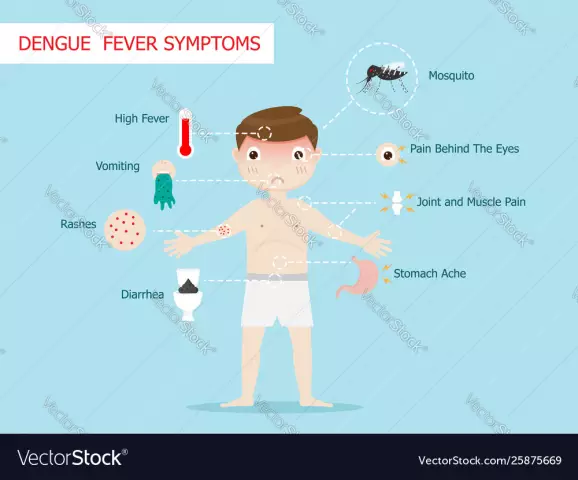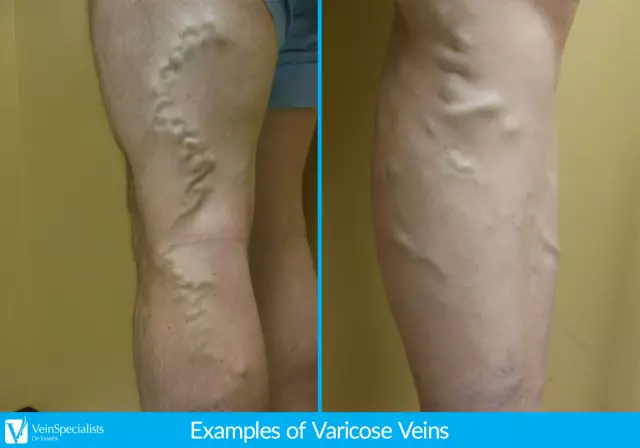- Author Rachel Wainwright wainwright@abchealthonline.com.
- Public 2023-12-15 07:39.
- Last modified 2025-11-02 20:14.
Endemic goiter
General characteristics of the disease

Endemic goiter is an enlargement of the thyroid gland caused by iodine deficiency in the body.
The cause of iodine deficiency can be an unbalanced diet - insufficient consumption of fish, meat, seaweed, shrimp, dairy products, oat and buckwheat, etc. A person receives about 90% of the daily need for iodine through nutrition.
Another possible reason for the appearance of endemic goiter is gastrointestinal diseases, leading to poor absorption of iodine trace elements. With pathologies of the intestine or stomach, it is possible to develop endemic goiter with complete or partial iodine deficiency, even if the patient's diet is rich in foodstuffs containing iodine.
About 5% is the daily intake of iodine, which a person receives from water. He gets the same amount thanks to the air saturated with iodine trace elements.
There are regions with a low iodine content in the environment and, accordingly, with a high risk of developing endemic goiter. These include, for example, the middle zone of Russia, including Moscow. Iodine deficiency is also observed in areas with increased background radiation.
Sometimes the appearance of an endemic goiter can provoke a systematic intake of drugs that block the absorption of iodine. These include Potassium perchlorate, Lithium carbonate, Nitrates, Sulfonamides, etc.
It is also possible a hereditary predisposition to the development of endemic goiter with a genetic defect in the production of thyroid hormones.
Symptoms of an endemic goiter
An enlargement (hyperplasia) of the thyroid gland with endemic goiter is the body's reaction to a low concentration of iodine and the deficiency of thyroid hormones caused by it. Often, in parallel with endemic goiter, a concomitant disease develops - hypothyroidism.
By increasing the mass of the thyroid gland, the body tries to compensate for the deficiency of thyroid hormones, and this leads to the following symptoms of endemic goiter:
- weakness,
- low physical endurance,
- discomfort in the region of the heart,
- headache.
These symptoms of endemic goiter can appear even at the subclinical stage of the disease with the size of the thyroid gland within the normal range and with an almost unchanged level of thyroid hormones.

With the further growth of the thyroid gland, new symptoms of endemic goiter appear:
- a feeling of squeezing in the neck
- difficulty swallowing and breathing
- dry cough,
- asthma attacks.
Symptoms of endemic goiter of the most severe stage are cardiac pathologies - the so-called development of a thymus heart, expressed in the expansion and hyperfunction of the right atrium and ventricle.
Among the possible complications of endemic goiter are called thyroid hemorrhage, acute and subacute thyroiditis, malignant transformation of the nodular form of the disease.
Diagnosis of endemic goiter
In the diagnosis of endemic goiter, laboratory tests of blood and urine are used. The blood of a patient with clinical symptoms of endemic goiter is tested for the level of hormones TSH, T3, T4, as well as thyroglobulin.
In patients with this type of disease, the balance of thyroid hormones is usually disturbed and an increased concentration of thyroglobulin is observed. Indicators of iodine excretion in urine, as a rule, are reduced.
An instrumental method for diagnosing endemic goiter is ultrasound. Thanks to him, the form of the disease is established: diffuse or nodular endemic goiter. By means of radioisotope scanning of the thyroid gland, the functional state of the organ is assessed.
In the nodular form of endemic goiter, a thyroid biopsy is additionally used to determine the benign or malignant nature of the disease.
Treatment of endemic goiter
Treatment tactics for endemic goiter depends on the degree of thyroid hyperplasia. With a slight increase in the size of the organ, several courses of Potassium Iodide are often sufficient. An obligatory part of the treatment of endemic goiter of the 1st degree is also diet therapy with products rich in iodine.
Treatment of endemic goiter, complicated by hypothyroidism, involves the appointment of hormone replacement therapy. An artificial analogue of thyroid hormones is Levothyroxine.
Treatment of nodular endemic goiter at a late stage of the disease is mainly surgical. To prevent recurrence of thyroid hyperplasia in the postoperative period, the patient is given hormone replacement therapy.
Prevention of endemic goiter
An effective prevention of the development of endemic goiter is the regular use of iodized table salt. It is extremely important to add salt to food after cooking, as trace elements of iodine are destroyed during heating.
Regular consumption of seafood, walnuts, persimmons also helps to reduce the likelihood of endemic goiter. The diet must necessarily contain dishes from fish and other products rich in iodine.
Endemic goiter in children

Endemic goiter in children is the most common iodine deficiency disease. The most common form of the disease is diffuse. According to statistics, over the past 10 years, the incidence of endemic goiter in children has increased by 6% and now accounts for approximately 25% of all children's endocrinological diseases.
Such high rates of morbidity are due to the disturbed nature of nutrition and unfavorable environmental conditions. In one third of cases, endemic goiter in children was diagnosed in adolescence (14 years and older).
The characteristic symptoms of endemic goiter in children are more intense. In addition, it is in childhood that the disease is most often complicated by the development of endemic cretinism: delayed intellectual and physical development, disorders of the central nervous system.
Due to the high prevalence of the disease and the severe consequences of endemic goiter in children, it is recommended to prevent iodine deficiency from the mother's pregnancy and continue throughout the child's life.
YouTube video related to the article:
The information is generalized and provided for informational purposes only. At the first sign of illness, see your doctor. Self-medication is hazardous to health!






